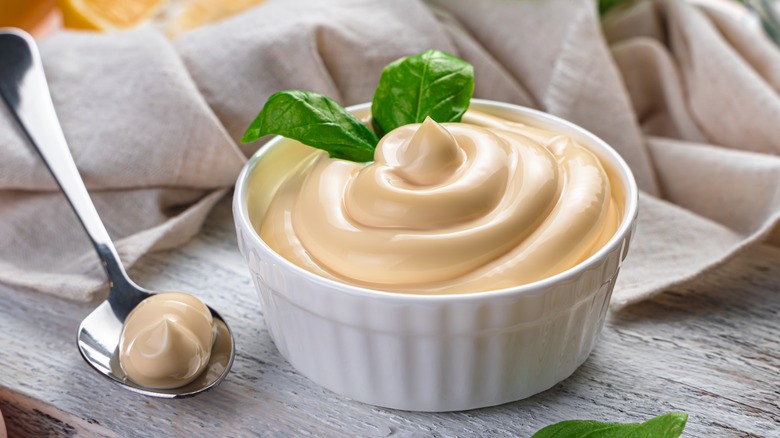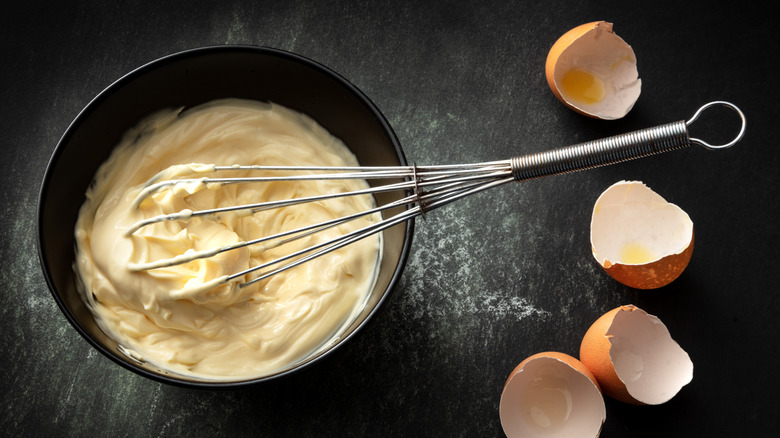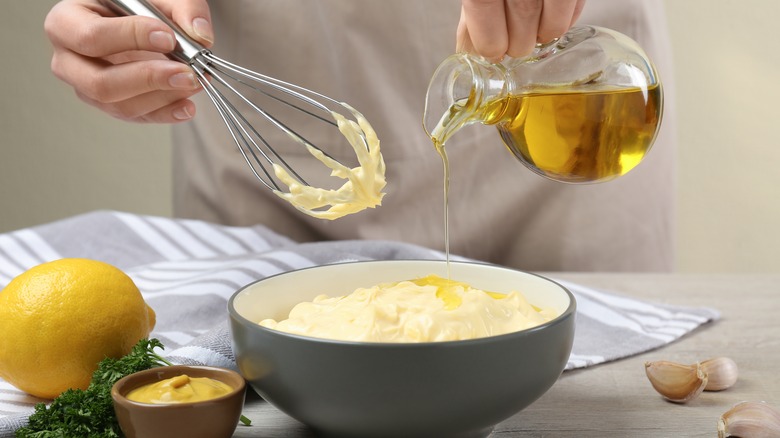Why Blending Olive Oil May Not Be The Best Idea For Mayonnaise
When you're whipping up a batch of homemade mayonnaise, the quickest method may be to add all of the ingredients into a blender and mix them all together. Most basic mayonnaise recipes call for eggs and oil as the base, with some lemon juice and seasonings to taste. However, you may want to hold off on pulling out the blender if you're using olive oil.
Blending olive oil can cause it to adopt an unpleasant, bitter flavor, which can in turn ruin your batch of homemade mayonnaise. This flavor seems to only become present when the olive oil is added to a blender or food processor, so it's perfectly safe to whisk or stir the mayonnaise instead — though this might require some additional elbow grease to get it to the right consistency. If you're intent on blending the condiment, you may want to swap in a different oil in exchange for the added speed.
Additionally, you could blend together all of the other ingredients first, then hand mix the olive oil into the mix as a last step. While this might require a little extra effort, it's a surefire way to get the best-tasting mayonnaise.
What causes the bitter flavor
The bitter taste may be due to the polyphenols present in the olive oil, reports Cook's Illustrated. The flavors of these polyphenols are normally hidden by a variety of fatty acids in the oil, preventing us from tasting them. However, when the oil is blended too rapidly by a blender or food processor, these fatty acid coatings can be stripped away, leaving the more bitter flavors exposed. These polyphenols are also water soluble, so the added lemon juice and egg whites may bring out more of their flavors as well.
Although these polyphenols may cause your mayonnaise to taste a little bitter when blended, they may be pretty beneficial for your health in the long run (per International Journal of Molecular Sciences). They are considered antioxidants and could help reduce inflammation, boost your immune system, or even aid in the prevention of certain cancers or diseases. Even the fatty acids in the oil are beneficial: Omega-3 fatty acids support better heart health (per Cleveland Clinic).
Other oils that can be swapped in to save the flavor
These polyphenols seem to be most prevalent in extra-virgin olive oil, especially if it has been more recently produced. Regular olive oil may be a better option for blending if you still want the health benefits of olive oil present in your mayonnaise, but it can take on a bit of a different flavor. It's a little more bland tasting than its extra-virgin counterpart.
This flavor change can be offset by adding in some extra seasonings — salt, pepper, or garlic are all fairly common options. Or, if you're just using homemade mayonnaise as an ingredient to create an aioli, you may not be so concerned with the flavor of the mayonnaise itself. Additionally, these added seasonings could help save your bitter mayonnaise if you do wind up blending extra-virgin olive oil in.
The next time you whip up a batch of homemade mayonnaise with olive oil, you may want to avoid the blender altogether to ensure you get the best-tasting condiment.


